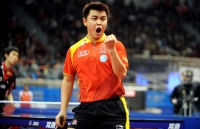 GUANGZHOU, Feb. 27 (Xinhua) -- World table tennis chief has been stern on pushing the proposal of limiting the number of citizenship-switching players, which to be voted on Friday by the board of the sport's ruling body. GUANGZHOU, Feb. 27 (Xinhua) -- World table tennis chief has been stern on pushing the proposal of limiting the number of citizenship-switching players, which to be voted on Friday by the board of the sport's ruling body.
"I don't know exactly how many associations are in favor of the proposal and how many are against. It depends on how each association thinks about it," Adham Sharara, president of the International Table Tennis Federation (ITTF), said here on Wednesday at a press conference.
"If they only think about their own benefits, maybe some of them will vote it down. But if they think what's the best for the sport or for the ITTF, then I believe they will be supportive," he added.
The table tennis boss, who has long been worried about the fact that Chinese-born paddlers play everywhere representing other countries or regions, has on several occasions voiced his support of the Swiss association's proposal.
If the proposal passes on Friday with a simple majority at the board of directors meeting, the ITTF will ban the 21-year-old and older players from changing allegiances in order to play World Cup and world championships.
According to the proposal, if someone aged 15 to 17 switches citizenship, he or she has to wait for three years before representing the adopted countries or regions, and it extends to five years for the 18-20 years old.
Chinese have dominated major table tennis events, with 17 Chinese women and 11 men among the top 20 world rankings.
Under Sharara's chairmanship the table tennis ball was enlarged from 38mm to 40mm and the "eleven points" scoring system was adopted, two changes deemed to restrict Chinese dominance in the sport.
Sharara admitted that China's dominance is what he has been worrying about, but denied that the proposal to limit the number of loyalty-switching players is once again aimed at China.
"First of all, all changes of the ITTF are not trying to be against any association, but to improve the sport itself," said Sharara.
"There're reformations to the competitive rules but China are still in the leading role of table tennis," he added. "Nothing could beat them because they are good."
But the chief insisted that the sport governing body had to do something about the situation.
"Imagine if we still had small balls, how fast the match will be today. Imagine if we still had 21 points, how boring the match is. Changes are made to improve the sport," he said.
"Imagine the Chinese football team playing Qatar and lost 3-0, and after the match we find the 11 players of Qatar are all from Brazil. How will you feel?
"Football is not dominated by some associations, like table tennis, because FIFA is a precise federation and we are trying to learn from other bodies."
It was said, after the proposal raised by the Swiss was made public, that Chinese players who want to extend their careers overseas will be hit hard if it passes. Sharara holds different opinions.
"There're very limited number of events. Just World Cup and world championship. We don't eliminate it but limit it. We want to push the national association to develop their own team," he said.
According to Sharara, the proposal has nothing to do with the Olympic Games.
"The Olympic Games have their own rules and our rule only limits the world championships and World Cup," he said.
"For overseas players, when they go to a country, they have many opportunities to play. They can play the national championship, they can play national league or they can train the local teams. So other country can use these players to improve their own national team," commented the Canadian.
"For my country, for example, it's easy to have players from Russia, Romania or China to develop a better team in two or three years, but the ITTF don't want this way," the president said.
"The problem is that every player has only one chance to play for their country. This rule will not deprive this from any one. We only think twice is two much," he added.
The proposal, if passed, won't be retroactive.
"The players already representing some countries can continue to represent," said Sharara.
Source: China ViewMore information: China View |